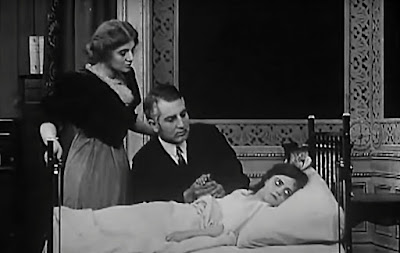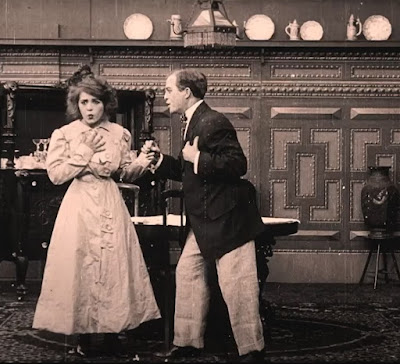Starring: Mary Pickford, Harold Goodwin, Albert Austin, and Rose Dione
Director: John Francis Dillon
Rating: Six of Ten Stars
A London laundress (Pickford) spins a fantasy that she is a disherited noblewoman who is just waiting to be rescued by her banished lover (Austin). As she tries to make her fantasy a reality, she pushes away and disregards a man who truly loves her (Goodwin).
"Suds" is one of those rare films where there's no antagonist whatsoever; the main character is the source of every obstacle to her success and happiness. It's also a film where every cast-member has a degree of presence and likeability that makes the film extremely watchable. Between the talented cast and some excellent photography, the film moves easily from comedy to drama and back to comedy again. Similarly, the subplot involving an aging horse might not have seemed as impactful and relevant as it did.
The leader of this excellent cast is, in every way, Mary Pickford. In the film's real world, her character is at times comedic, at times uncouth bordering on revolting, at times so pitiful it makes the viewer want to cry for her. On the other hand, in the world of her character's imagination, she is poised, elegant, devoted to her lover beyond concern for even her own life. Where the real character is scattered and clumsy, she imagines herself as focused and graceful. It is in this form that we get to see the Mary Pickford we can recognize from other films.
Perhaps the most tragic thing about Pickford's character in "Suds" is that she is actually the noble character she imagines herself to be, at least in personality. The aforementioned subplot with the draft horse sees her go above and beyond to save it shows her kind and noble character very clearly. She doesn't have the self-esteem and social grace to apply it properly.
If you have enjoyed Mary Pickford in other films, I think you're going to enjoy her here, too. She gets to play a character very different from what you have seen her do before, but she also provides some examples of her "standard" performance styles.
Click below to watch "Suds" in its entirety. The version featured has a modern score that works in some places and doesn't in others. For all I know, it might be a random piece of instrumental music that is just repeated over and over... and any of the times when it matches perfectly with the action on the screen is purely luck.































.jpg)
